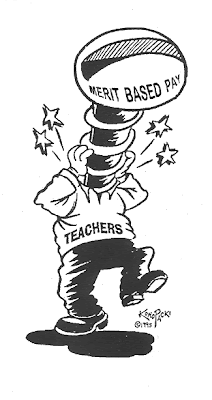The UFT is against the individual merit pay provision in NCLB but will accept (even if they don't say so openly) building merit pay as not being as onerous. Sure. The UFT/AFT should be calling for the total abolition of NCLB, which has been so onerous to teachers, students and parents. But much of the NCLB law could have been written by Shanker.
I spent m
 onths in 2002 trying to get a resolution at the DA urging a fight against all forms of merit pay but was stonewalled by Weingarten. That frustrating experience gave me an insight into where she was really coming from and led to a break with her that moved me to change direction from trying to use friendly persuasion on Randi to open opposition.
onths in 2002 trying to get a resolution at the DA urging a fight against all forms of merit pay but was stonewalled by Weingarten. That frustrating experience gave me an insight into where she was really coming from and led to a break with her that moved me to change direction from trying to use friendly persuasion on Randi to open opposition.Marian Swerdlow and others in TJC were totally supportive of my efforts at the time despite being mildly critical of Ed Notes for trying to play ball with Randi for the 5 previous years. They were so right.
My bone to pick with this resolution is that if there would be a nationwide demo, it should address the core issues of joining with others around the nation to fight against reauthorization of the entire NCLB Act and not limit it to such a narrow focus as merit pay. But this is a specificly targeted resolution that also addresses the building merit pay issue and if passed (snowball in hell territory here) it could be expanded in the future. Urge your reps to support it at Weds. DA. If they are Unity Caucus, ask them to explain why they are opposed.
To be presented at the UFT Delegate Assembly, Oct. 17 by Teachers for a Just Contract.
THE UFT MUST LAUNCH A REAL FIGHT AGAINST MERIT PAY
The reauthorized No Child Left Behind Act is heading towards the inclusion of a provision forcing school districts to implement individual merit pay to teachers as a condition for receiving important federal funding. Individual merit pay is not only intrinsically unfair, the competition among colleagues it engenders destroys our ability to act together as a union. It is also destructive to the mutually helpful cooperation that goes on among teachers all the time: comparing and sharing experiences, methods, lesson plans, etc. (School based merit pay is equally unfair and carries its own set of problems as well.) What this would mean is that part of the pay package we negotiate, instead of going to across the board raises, would be dedicated to this unfair and destructive scheme.
Unfortunately, but not surprisingly, Weingarten and the union leadership have no credible plan to protect us from this threat. Teachers for a Just Contract will be proposing an effective launch for a serious campaign to defeat this threat at the Delegate Assembly on Wednesday, October 17, by proposing the resolution below. It calls for a nationwide demonstration by teachers in Washington D.C., to publicize the dangers of merit pay to education, and put our representatives - Democrats and Republicans alike - that we will take this fight to the mat.
The reauthorized No Child Left Behind Act is heading towards the inclusion of a provision forcing school districts to implement individual merit pay to teachers as a condition for receiving important federal funding. Individual merit pay is not only intrinsically unfair, the competition among colleagues it engenders destroys our ability to act together as a union. It is also destructive to the mutually helpful cooperation that goes on among teachers all the time: comparing and sharing experiences, methods, lesson plans, etc. (School based merit pay is equally unfair and carries its own set of problems as well.) What this would mean is that part of the pay package we negotiate, instead of going to across the board raises, would be dedicated to this unfair and destructive scheme.
Unfortunately, but not surprisingly, Weingarten and the union leadership have no credible plan to protect us from this threat. Teachers for a Just Contract will be proposing an effective launch for a serious campaign to defeat this threat at the Delegate Assembly on Wednesday, October 17, by proposing the resolution below. It calls for a nationwide demonstration by teachers in Washington D.C., to publicize the dangers of merit pay to education, and put our representatives - Democrats and Republicans alike - that we will take this fight to the mat.
Resolution Against Using the Threat of Defunding Schools to Impose Merit Pay
Whereas: Merit pay is intrinsically unfair and detrimental to professionalism and union solidarity among teachers;
Whereas: Any provision of federal law making Title I funding to a district conditional upon its imposition of pay for performance (a.k.a.merit pay), whether individual or school-based, as measured by testing, as proposed for the reauthorization of the No Child Left Behind Law, virtually imposes this unfair scheme on nearly all of our nation's teachers;
Whereas: We cannot depend upon writing letters and lobbying Senators and Congresspersons to be enough to stop this strong and serious threat to our students, our profession and our unions;
Whereas: holding mass demonstrations in the nation's capital has proven an effective tool for pressuring Congress and winning public support for past social causes, including peace, civil rights and women's rights;
Therefore, be it resolved, that the UFT will initiate, organize and build among our sister teacher union locals a nation wide demonstration and protest, to be held in Washington, D.C., at the earliest optimal date for the dual purpose of focusing public attention on our powerful arguments against merit pay based on testing, and demonstrating to our elected representatives the strength and resolve of our opposition to this provision.



